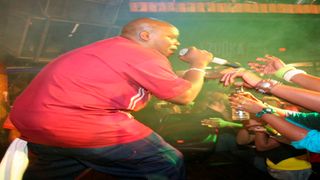
Musician Nonini performs during the Zuqka party at the Carnivore Restaurant in Nairobi on July 18, 2009.
| File | Nation Media GroupWeekend
Premium
20 years of Sherehe, Sheng-genge, Shembeteng tone in literature
It was just after 4 p.m. at the Alliance Francaise last Friday, and Dorphan – the man without whom spoken word in Nairobi would be a bit of an orphan – was lamenting about how “genge” music, circa 2003 A.D., took away from the reality lyrics of hip-hop of places like Dandora.
The occasion was an event organised by Qwani’s founding editor Keith Agana (they say imitation is the greatest form of flattery) to ‘discuss the evolution of sheng kwa literature na mangoma …’
The event’s ‘githaa’ was 4 to 7 pm (it would run until 8.30 pm), and it was ‘sare’ to the public, thus guaranteeing a near full house.
Dorphan farther said it was the class divide that led to the rise of ‘kapuka,’ with E-Sir, Big Pin and the rest of those city boys singing about ‘tuendee tuka wake, huko Nairobi West, tupitie South C …’
But, with all due respect, Dorphan the Spoken Word maestro was wrong about ‘genge’ (and ‘kapuka’) taking away from mainstream local hip-hop.
The point being that in 2003 A.D., after the fall of Kanu, and with the coming in of a new ‘Rainbow’ regime, the nation was in euphoric mode, with the mood being all about party songs, including in the Eastlands sector, Nonini’s ‘Keroro’ the big binge lyrical example of that trend. In fact, at that point, Kenyans were declared the “most optimistic people in the world” (we are now 111th on the ‘happiness’ list compiled by Sustainable Development Solutions’ Network, with the Finns the happiest for the seventh time in a row).
Whatever the case, sheng was now the language of genge, the music of the youth, and therefore sheng was now also the language of the youth, finally with concrete artistic content within which to reference itself.
But what about ‘sheng’ in literature, was it featured anywhere?
In the classic Kwani?2 literary magazine of 2003, this after the now legendary return of Binyavanga Wainaina to found Kwani? (alongside the likes of Tom Maliti), there are two stories by a writer writing under the pseudonym ‘Jambazi Fulani …’
The first story ‘Nyof Nyof’ is in sheng.
“Ati makanga wa hii 58 mathree yuko mbolox so Koi anafuata nyayo za Waf kwa sabab hizi ni masaa za Ngilu na anatak kumdate!” The sheng, dated as it is (so cool in 2003) is so cute!
Then you leave this story on page 58, and skip to page 128, and here is ‘Nai Reloaded,’ with Jambazi Fulani having flipped the sheng (Swahili + English) to ‘Engsh’ (English + Swahili), the lingua franca of the cool kids, as opposed to ‘sheng’ which is Eastlando.
“Nish juad Malo was going to pick her up at Kengeles of ABC. I mean that is where he said he would be after Pavements. She picked up her Siemens again to call but nasikatika mteja hawe (sic) and isht is all she heard …’
Siemens as a phone fashion brand may be dead on the ‘pavements,’ but the coolly disconnected nature of Nish in her niche dealings with communication is as ‘nice’ now as it was neat in 2003. True engagement, to be truly cool, is to be avoided.
After Lexus Mshairi had done his spoken word piece, it was time for this writer to explain his ‘Sminglish’ in journalism, a made-up lingo (mostly of Engsh/Sheng, with Russian suffixes) that was popular with large segments of the youth between 2004 and 2019.
(Two words, ‘vodoski’ for vodka and ‘kibandasky’ for local eating kiosks, made it into the popular lexicon).
It was interesting to look back at some of the ‘in’ slang words from the first quarter of 2016.
‘Andas’ for having nothing/ being broke, ‘bogof’ for a cheapskate, boikelo for a ‘charming person,’ BaFaFa ( Best Friends Forever), doola for a dullard, fyam for ‘just fine,’ ‘imeruru’ for it’s beaten down, kujigunduz for self-gentrification, ‘kuskuma hush’ ( sleeping out of sheer exhaustion), matiptips na madungalaz ( drinks and drugs), niko Chase ( super-broke, as Chase bank was collapsing at the time), One Drop ( a big butt), Ongwada na Ongwashe ( ugly boy, girl) and ‘perenyonyo Bensouda’ or a snitch – named after the people giving the ICC prosecutor evidence at The Hague.
Wairimo wa Vernacular then sat upfront to ‘wage war on English’ (in what very much sounded like a near millennial rehash of Ngugi wa Thiongo), before the bypassing AF director stopped by to give an impromptu lecture on why French colonialism was better than English colonialism … ‘we put the African tribe on top.’
Which is both utter claptrap and pure balderdash, as French assimilation sought to wipe out both the native tongue and African identity and replace it with ‘civilised’ French language and affected mannerisms (Francophone Africa still has identity crisis to date, hence resentment of the French there and recent embrace of the Russians).
Then came Covid-19 in 2020, and with it the rise of ‘Shembeteng.’
Popularised online by Jeshi Jinga of Umoja, Master wa Kayole and Madocho wa Dandoch (not to be mistaken with the extrajudicial police executioners Hessy wa Dandoch and Hessy wa Kayole of 2018/19 infamy), shembeteng was also a language of suffixes.
Its ‘ngeli’ (na sio ya genge, a la Jua Cali) consisted of adding mbata, mbete, mbiti, mboto or ‘mbutu’ to existing sheng words, so that ‘naku love’ becomes ‘nakulombotov’ and I Hate You is ‘nakuhambatate.’
Here is a sentence in Shembeteng – “Tulikuwa tumeenda kumbutunywa uko Kayombotole na mabeshte na mazembete, lakini huyo Mkisimbiti kuntanka aka fika na Jembeteshi, tuka muokta!’ * (We had gone to Kayole to drink with some friends and hot ladies, but that silly Kisii guy came with a gang, forcing us to flee the scene).
By 2022, the youth dictating the sheng scene were gengetone musicians like Wakadinali, with all the ‘ngumi mbwegzes’ and ‘subaru ya mamburus’ (inakam na imejaa).
Twenty years away from 2003 – long ago, but not as long as it seems. Kanu fell, Kibaki ruled, the EPL reigned, PEV happened, a new Constitution was born, the cell phone( born then) became the smart phone, the Internet exploded, social media became everything to everyone, ‘celeb culture’ caught on in Kenya, and local pop culture accelerated, music went from genge to gengetone, and street lingo went from sheng to shembeteng …
Now in 2023, we have the Sheng Tezzo youth, whose slang is far more popular than their songs.
Not everyone is their fan, though. There’s always someone against sheng!
A lawyer pal, looking at them and listening to their YouTube video ‘dissing’ clean living-and-speaking Tanzanian musicians opined thus: “As Kenyans, we disown these sheng tezzo goons. They will be used against us at some point in the near future.”
He went further to advice that we “arrest these suspects, asap, and look for suitable charges. And don’t bother about offences, they are already guilty of everything...”
Then dropping a wink to show how far sheng has sunk, even into the language of learned friends, he added, without irony:
“Hii kitu kitaturamba!”





